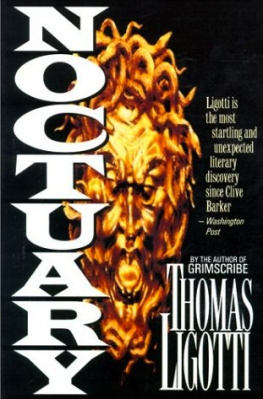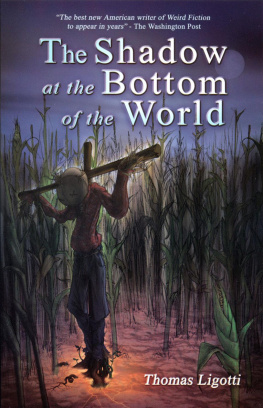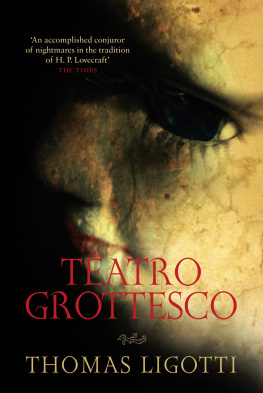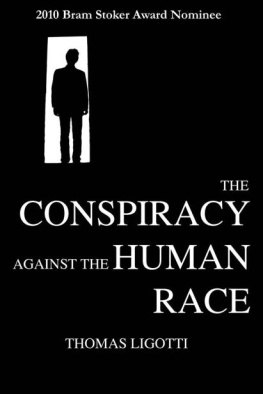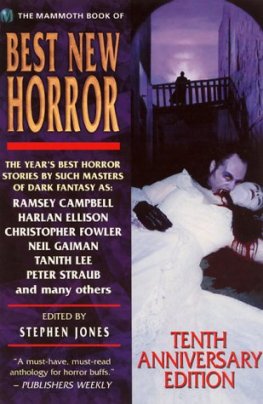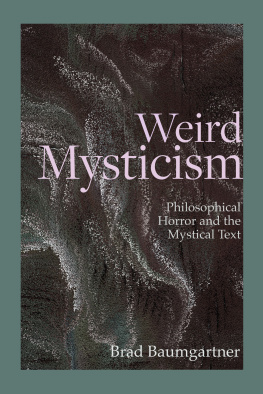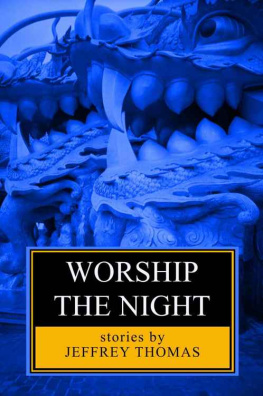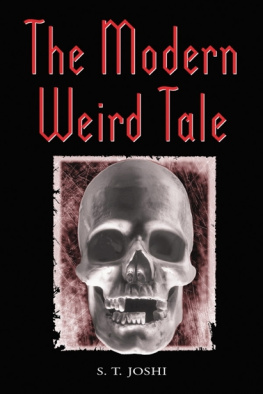Thomas Ligotti - Noctuary
Here you can read online Thomas Ligotti - Noctuary full text of the book (entire story) in english for free. Download pdf and epub, get meaning, cover and reviews about this ebook. year: 1995, publisher: Carroll & Graf Publishers, genre: Detective and thriller. Description of the work, (preface) as well as reviews are available. Best literature library LitArk.com created for fans of good reading and offers a wide selection of genres:
Romance novel
Science fiction
Adventure
Detective
Science
History
Home and family
Prose
Art
Politics
Computer
Non-fiction
Religion
Business
Children
Humor
Choose a favorite category and find really read worthwhile books. Enjoy immersion in the world of imagination, feel the emotions of the characters or learn something new for yourself, make an fascinating discovery.
- Book:Noctuary
- Author:
- Publisher:Carroll & Graf Publishers
- Genre:
- Year:1995
- Rating:5 / 5
- Favourites:Add to favourites
- Your mark:
- 100
- 1
- 2
- 3
- 4
- 5
Noctuary: summary, description and annotation
We offer to read an annotation, description, summary or preface (depends on what the author of the book "Noctuary" wrote himself). If you haven't found the necessary information about the book — write in the comments, we will try to find it.
Noctuary — read online for free the complete book (whole text) full work
Below is the text of the book, divided by pages. System saving the place of the last page read, allows you to conveniently read the book "Noctuary" online for free, without having to search again every time where you left off. Put a bookmark, and you can go to the page where you finished reading at any time.
Font size:
Interval:
Bookmark:
A Note on the Appreciation of Weird Fiction
No one needs to be told about what is weird. It is something that becomes known in the early stages of every life. With the very first nightmare or a childhood bout of fever, an initiation takes place into a universal, and at the same time very secret society. Membership in this society is renewed by a lifelong series of encounters with the weird, which may assume a variety of forms and wears many faces. Some of these forms and faces are familiar only to oneself, while others are recognized by practically everybody, whether they will admit it or not.
Weird experience is in fact so prevalent that it is taken profoundly for granted, lying unnoticed in the back rooms of a person's life and even further removed in the life of the world at large. But it is always there, waiting to be recalled in those special moments that are all its own. These moments are for the most part rather brief and relatively rare: the intense weirdness of a dream fades upon waking and is often utterly forgotten; the twisted thoughts of a delirium soon uncoil themselves upon recovery from illness; even a first-hand, wide-awake confrontation with the extraordinary may lose the shocking strangeness it initially possessed and ultimately consign itself to one of those back rooms, those waiting rooms of the weird.
So the point is clear: experience of the weird is a fundamental and inescapable fact of life. And, like all such facts, it eventually finds its way into forms of artistic expression. One of those forms has been termed, of all things, weird fiction. The stories that constitute this literary genre are repositories of the weird; they are something like those remote rooms where the dreams and deliriums and spectral encounters are kept, except that they may be visited at any time and thus make up a vast museum where the weird is on permanent display.
But does anyone need to be told what weird fiction is all about, anymore than an introduction is required to the weird itself? It is strongly possible that the answer to this question is yes. The reason for this answer is that weird fiction is not something experienced in the same way by everyone: it is not a nightmare or a fit of fever; certainly it is not a meeting in the mist with something that is not supposed to be. It is only a type of story, and a story is an echo or a transmutation of experience, while also an experience in its own right, different from any other in the way it happens to someone and in the way it is felt. It seems probable, then, that the experience of weird stories can be enhanced and illuminated by focusing on their special qualities, their various forms and many faces.
For example, there is a well-known story that goes as follows: A man awakes in the darkness and reaches over for his eyeglasses on the nightstand. The eyeglasses are placed in his hand.
This is the bare bones of so many tales that have caused readers to shiver with a sense of the weird. You might simply accept this shiver and pass on to other things; you might even try to suppress the full power of this episode if it be too vividly conceived. On the other hand, it is possible, and considered by some to be desirable, to achieve the optimal receptiveness to the incident in question, to open up to it in order to allow its complete effect and suggestiveness to take hold.
This is not a matter of deliberate effort; on the contrary, how much more difficult it is to put this scene out of one's mind, especially if such a story is read at the proper time and under proper circumstances. Then it happens that a reader's own mind is filled with the darkness of that room in which someone, anyone, awakes. Then it happens that the inside of a reader's skull becomes the shadow-draped walls of that room and the whole drama is contained in a place from which there is no escape.
Stripped-down as this tale is, it nonetheless does not lack for plot. There is the most natural of beginnings, the perfect action of the middle, and a curtain-closer of an end that drops down darkness upon darkness. There is a protagonist and an antagonist and a meeting between them which, abrupt as it is, remains crystalline in its fateful nature. No epilogue is required to settle the issue that the man has awakened to something that has been waiting for him, and for no one else, in that dark room. And the weirdness of it, looked full in the face, can be quite affecting.
Once again: A man awakes in the darkness and reaches over for his eyeglasses on the nightstand. The eyeglasses are placed in his hand.
At this point it should be recalled that there is an old identity between the words "weird" and "fate" (of which one notable modern instance is Clark Ashton Smith's "The Weird of Avoosl Wuthoqquan," the fate of the title character being one that is prophesied by a beggar and consummated by a famished monstrosity). And this old pair of synonyms insists on the resurrection of an old philosophy, even the oldest - that of fatalism.
To perceive, even if mistakenly, that all one's steps have been heading toward a prearranged appointment, to realize one has come face to face with what seems to have been waiting all along - this is the necessary framework, the supporting skeleton of the weird. Of course, fatalism, as a philosophical slant on human existence, has long since been out of fashion, eclipsed by a taste for indeterminacy and a mock-up of an "open-ended" universe. It nevertheless happens that certain ordeals in the lives of actual people may reinstate an ancient, irrational view of things. Such ordeals always strike one with their strangeness, their digression from the normal flow of events, and often provoke a universal protest: "Why me?" Be sure that this is not a question but an outcry. The person who screams it has been instilled with an astonishing suspicion that he, in fact, has been the perfect subject for a very specific "weird," a tailor-made fate, and that a prior engagement, in all its weirdness, was fulfilled at the appointed time and place.
No doubt this queer sense of destiny is an illusion. And the illusion is created by the same stuff that fleshes out the skeletal framework of the weird. This is the stuff of dreams, of fever, of unheard-of encounters; it clings to the bones of the weird and fills out its various forms and fills in its many faces. Because in order for the illusion of fate to be most deeply established, it must be connected to some matter that is out of the ordinary, something that was not considered part of the existential plan, though in retrospect cannot be seen otherwise.
After all, no weird revelation is involved when someone sees a dime on the sidewalk, picks up the coin, and pockets it. Even if this is not an everyday occurrence for a given individual, it remains without any overtones or implications of the fateful, the extraordinary. But suppose this coin has some unusual feature that, upon investigation, makes it a token of considerable wealth. Suddenly a great change, or at least the potential for change, enters into someone's life; suddenly the expected course of things threatens to veer off toward wholly unforeseen destinations.
It could seem that the coin might have been overlooked as it lay on the pavement, that its finder might easily have passed it by as others surely had done. But whoever has found this unusual object and discovers its significance soon realizes something: he has been lured into a trap and is finding it difficult to imagine that things might have been different. The former prospects of his life become distant and can now be seen to have been tentative in any case: what did he ever really know about the path his life was on before he came upon that coin? Obviously very little. But what does he know about such things now that they have taken a rather melodramatic turn? No more than he ever did, which becomes even more apparent when he eventually falls victim to a spectral numismatist who wants his rare coin returned. Then our finder-keeper comes into a terrible knowledge about the unknowable, the mysterious, the truly weird aspect of his existence - the extraordinary fact of the universe and of one's being in it. Paradoxically, it is the uncommon event that may best demonstrate the common predicament.
Font size:
Interval:
Bookmark:
Similar books «Noctuary»
Look at similar books to Noctuary. We have selected literature similar in name and meaning in the hope of providing readers with more options to find new, interesting, not yet read works.
Discussion, reviews of the book Noctuary and just readers' own opinions. Leave your comments, write what you think about the work, its meaning or the main characters. Specify what exactly you liked and what you didn't like, and why you think so.

